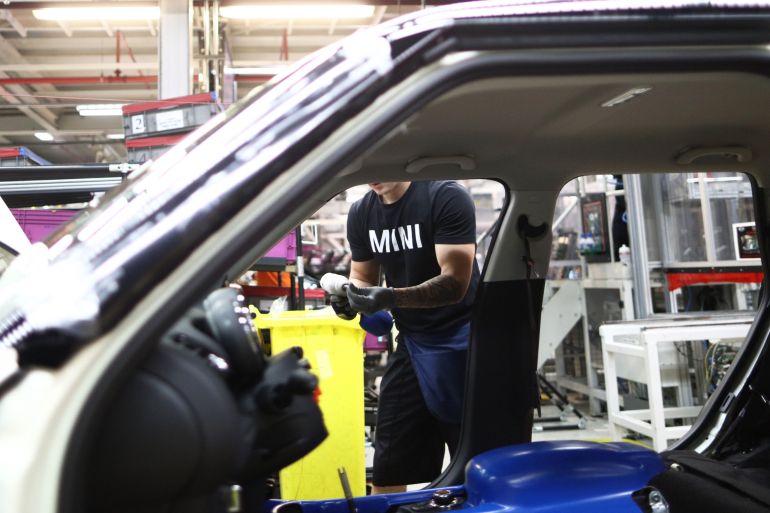Car firms, tech giants feel squeeze of worsening chip shortage
Apple, Samsung, BMW, Ford, Honda say they will either pause production or predict falling sales due to chip shortfall.

The global chip shortage is going from bad to worse with automakers on three continents joining tech giants Apple Inc. and Samsung Electronics Co. in flagging production cuts and lost revenue from the crisis.
In a dizzying stretch of 12 hours, Honda Motor Co. said it will halt production at three plants in Japan for around five to six days next month; BMW AG flagged it will pause Mini car production at its Oxford, England, factory for three days; and Ford Motor Co. reduced its full-year earnings forecast due to the debilitating chip shortage, which it sees extending into next year.
Keep reading
list of 4 itemsGlobal chip shortage to last into 2022: Semiconductor giant TSMC
As Biden meets CEOs to tackle chip shortage, Intel offers hope
Global chip shortage on agenda as White House convenes US CEOs
Now, the very companies that benefitted from surging demand for phones, laptops and electronics during the pandemic that caused the chip shortage, are starting to feel the pinch. After a blockbuster second quarter, Apple Chief Financial Officer Luca Maestri warned that supply constraints are crimping sales of iPads and Macs, two products that performed especially well during lockdowns. Maestri said this will knock $3 billion to $4 billion off revenue during the fiscal third quarter.
Samsung, which is both a producer and user of chips, said Thursday that revenue and profit at its mobile division, which produces its marquee Galaxy smartphones, will slide this quarter because of component shortages and weak demand for flagship models.
The shortfall of critically needed semiconductors has forced the entire auto industry to cut output, leaving thin inventories at dealerships just as consumers emerge from Covid-19 lockdowns. In just the past week, Jaguar Land Rover Automotive Plc, Volvo Group and Mitsubishi Motors Corp. have joined the list of carmakers idling factories. Consultant AlixPartners has said the chip shortage could cost automakers $61 billion in lost sales this year.
“The second quarter is going to be worse for automakers than the first quarter,” said Song Sun-jae, an analyst at Hana Daetoo Securities Co. in Seoul. “The chip-shortage problem could end up lasting longer, maybe into next year.”
BMW shares fell as much as 0.7% shortly after the open of regular trading in Frankfurt. The stock is up about 19% for the year.
![Gap between ordering a computer chip and receiving it chart [Bloomberg]](/wp-content/uploads/2021/04/370698256-1.jpg?w=770&resize=770%2C433)
Beyond Apple, whose high-specification iPhones and aggressive demands typically place it at the front of the line, deepening chip shortages threaten to dampen a nascent rebound in the entire smartphone market. Worldwide shipments surged an estimated 27% to 347 million devices in the first quarter — aided by a plethora of new models and China’s swift post-pandemic recovery — but a shortage of components such as app processors could sap that momentum over the rest of 2021.
“Covid-19 is still a major consideration, but it is no longer the main bottleneck,” Canalys Research Manager Ben Stanton wrote Thursday. “Supply of critical components, such as chipsets, has quickly become a major concern, and will hinder smartphone shipments in the coming quarters.”
At Ford, the shortage will likely reduce production by 1.1 million vehicles this year, John Lawler, the company’s chief financial officer, said on a call with reporters.
Tesla Inc. Chief Executive Officer Elon Musk this week called the chip shortage a “huge problem.” NXP Semiconductors NV said it’s expecting supply to be tight all year and warned constraints for the auto industry could extend into 2022.
“There are too many uncertainties about when chip supplies will improve, and that’s making it difficult for automakers,” said Lee Han-joon, an analyst at KTB Investment & Securities Co. in Seoul. “For semiconductor makers, the auto industry isn’t really seen as one of their key customers and that’s putting the carmakers in a much tougher position in securing supplies.”